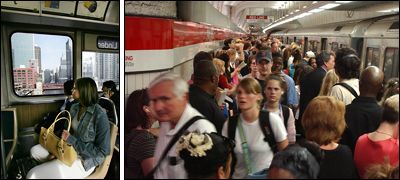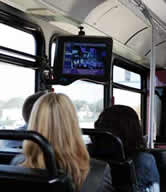City transit systems struggle to stay on track
 CHUG CHUG: Left, rush-hour commuters rumble over the Chicago River on one of the city's elevated trains; at right, riders crowd a subway platform in Boston. Across the country, transit systems are in financial trouble - and commuters are feeling the pinch, with reduced service and higher fares. M. SPENCER GREEN/AP, JOHN NORDELL - STAFF/FILE. From the Christian Science Monitor.
CHUG CHUG: Left, rush-hour commuters rumble over the Chicago River on one of the city's elevated trains; at right, riders crowd a subway platform in Boston. Across the country, transit systems are in financial trouble - and commuters are feeling the pinch, with reduced service and higher fares. M. SPENCER GREEN/AP, JOHN NORDELL - STAFF/FILE. From the Christian Science Monitor.Today's Christian Science Monitor reports in "City transit systems struggle to stay on track" that
"Flat or declining revenue, combined with big increases for fuel and labor costs and, in some places, declining ridership, has created cash-strapped agencies and a rash of fare hikes and service cuts. It's a situation that has public-transit advocates crying for more funding even as critics insist the agencies need to do a better job of paying for themselves, without increases in government subsidies. And some say that while multiple bailout options may help avert immediate disasters in places like Chicago, long-term solutions require a serious commitment to the idea of public transit."
"Transit systems have had a hard time over many, many years, and they've become very efficient," says Alan Horowitz, a civil-engineering professor at the University of Wisconsin-Milwaukee. "We're providing an essential public service with transportation, and there still is a fairly large segment of the population that's dependent on transit. We have to decide as a society if this is something we want to support."
Transit agencies around the country have been feeling a pinch for some time, and customers are beginning to feel the cost. New York, Boston, and Washington, D.C., have all raised fares in the past couple of years, while Philadelphia has been threatened with fare hikes for months. Pittsburgh cut service along with raising fares, and San Francisco is holding hearings this month to consider both.
"It's a trend happening around the country," says William Millar, president of the American Public Transportation Association. "You have relatively flat income streams, skyrocketing major expenses" - including fuel, liability insurance, healthcare, and pensions - "and it isn't very long before that puts you on a collision course that requires drastic actions."
Mr. Millar and other experts note that transportation benefits people beyond direct customers by reducing congestion. The 2005 Urban Mobility Report, released last week by the Texas Transportation Institute, indicated that traffic delays would be nearly 30 percent worse - or cost an additional 1.1 billion hours - without public transit.
Both fare hikes and service cuts tend to make riders leave, Millar says. Both combined - the current plan in Chicago - can be disastrous."
 Television advertising on buses in Atlanta.
Television advertising on buses in Atlanta.



0 Comments:
Post a Comment
<< Home